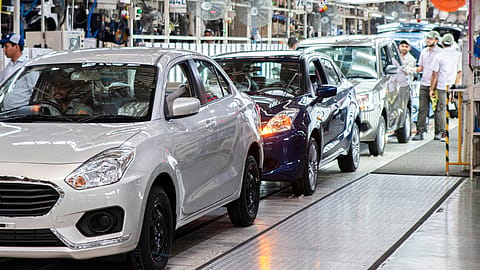Passenger vehicle sales to grow 9-10% YoY to 50 lakh units by 2024: CRISIL
This will be approximately 20% above the pre-pandemic peak of 40.5 lakh units, which also will be the highest-ever sales achieved by domestic PV original equipment manufacturers (OEMs).

The overall passenger vehicle (PV) sales will grow 9% to 10% year-on-year (YoY) to 50 lakh units in the next fiscal, according to the latest report by CRISIL Ratings. This will be approximately 20% above the pre-pandemic peak of 40.5 lakh units, which also will be the highest-ever sales achieved by domestic PV original equipment manufacturers (OEMs). According to the rating agency, the growth in passenger vehicle sales will be led by pent-up demand, especially for sport utility vehicles (SUVs), higher incomes, and easing availability of semiconductors even as export growth remains sluggish.
"The healthy volume growth, together with moderating commodity prices, will enable better operating leverage, helping original equipment manufacturers (OEMs) offset the increase in costs incurred in complying with new regulations," the rating agency says.
For the current fiscal, domestic passenger vehicle (PV) volume is estimated to grow by 24% to 26%, driven by pent-up demand and a large order backlog because of the semiconductor shortage last fiscal. In the first 10 months of the current fiscal, domestic sales accounted for 85% of the passenger vehicle volume.
"Domestic PV sales volume should grow 10-12% next fiscal, led by SUVs, which are set to nearly double their share in overall domestic sales to ~55% from ~28% in fiscal 2018. A sharper focus of OEMs on SUVs, including compact SUVs, fuelled by customer preference, is driving growth, even as sales of sedans and entry-level passenger cars remain sluggish. Export growth is expected at a subdued 2-4%, mainly due to restrictions on repatriation of foreign exchange and high inflationary trends in key export markets," Anuj Sethi, senior director, CRISIL Ratings says.
According to the rating agency, the operating margins of passenger vehicles will increase by 100-200 basis points (bps), to approximately 9% to 10% in 2024, despite higher costs for components being installed for regulations. The rating agency has cited moderation in the prices of key raw materials such as steel, aluminum, and rubber in the past five months, multiple price hikes by original equipment manufacturers (OEMs), and strong volume growth to be the reason behind an increase in operating margin.
"The credit profiles of OEMs rated by us have remained stable despite lower volumes during the pandemic, due to their strong balance sheets and healthy liquidity. With demand sentiments remaining healthy, OEMs have resumed creating a pipeline for future launches, including EV models. Hence, capital spending is estimated to increase ~54% to ~₹27,000 crore in fiscal 2023 and 2024 compared with the previous two fiscal. Still, healthy cash generation and the strong liquid surplus will ensure external borrowings remain low," says Naren Kartic.K, associate director, CRISIL Ratings.
The rating agency estimates the ratio of debt to earnings before interest, tax, depreciation and amortization at less than 0.2 times and interest cover at over 30 times for its rated portfolio next fiscal.